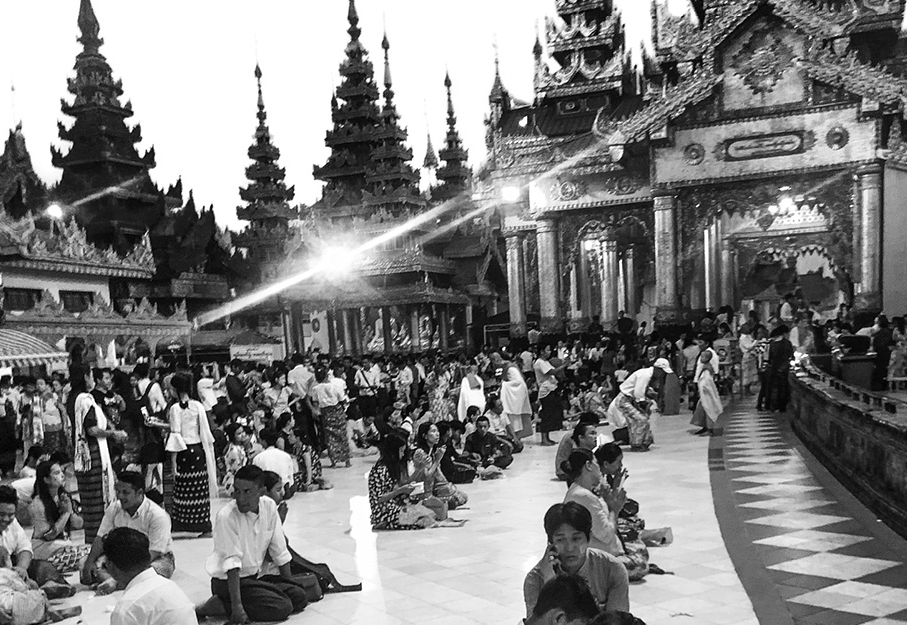Myanmar Obedience

New Year’s prayers at Shwedagon Pagoda, Yangon, Myanmar.
“Would you like a cup of tea?” In Myanmar, the answer is always yes. Whether or not you actually want a hot drink, when someone offers, you accept.
This is anade, a deep empathy for the feeling of others and overwhelming desire to avoid causing embarrassment. Even to refuse a drink or second helping of food would be seen as a potential loss of face for the person offering it. So you say yes, even if only to avoid social embarrassment. You show restraint, subverting your individual preferences to the greater good of social harmony, one maintained by the national culture of obedience.
Anade informs how people think about every aspect of their everyday lives. It is a prism for every small decision you make: how can I avoid awkward situations for other people, or putting them to any trouble? One time this goes completely out of the window is during the water festival before the New Year: where everyone sprays each other with water for four days, to cleanse the sins of the past year. Obedience to this tradition overrides any sense of embarrassment.
Myanmar’s culture is underpinned by gadaw, the hierarchical principle that respects age and social class, with elders and those of higher social standing automatically given respect regardless of the circumstances. A Burmese friend’s father is a professor, and I would see the way his students doted on him, hanging on his every word and never questioning his arguments. It is the same in the workplace. No 360-degree-feedback here: what the boss says goes, even if they are only marginally older or more senior to you in the organization. You put obedience to the hierarchy and wisdom of your elders before expressing your own opinions and criticisms.
Obedience is deeply engrained in Burmese culture, arising at least in part from the sila (morality) that is the cornerstone of the Buddhist path to enlightenment, in a country where 90 percent of the population practice the religion. The national religion also dictates a collective focus on the importance of karma: maximizing your good deeds while mitigating the bad. As Buddhists, most Burmese are heavily concerned with the attainment of punna (merit), which may help explain why Myanmar has frequently ranked at the top of the World Giving Index, which measures a combination of charitable donations, volunteering, and the willingness to help strangers and those in need. What’s more, no one will ever accept a tip in return for services, on the basis that it isn’t their money to take. Obedience is seen as part of what it means to be a good person, and to maintain good karma. People try to live in the path of the Buddha—good words, good deeds, good thoughts—as obediently as they can.
A long history of oppression, from the British colonial regime to the military junta that ruled from 1962 to 2011, and the atrocities that have subsequently been committed against the Rohingya Muslim minority, are another root of the obedience culture, with dissent and protest routinely suppressed in the most violent way. Where obedience is not found in Myanmar it is imposed, often brutally so.
During the pro-democracy protests of 1988, thousands were killed by the military and security forces. Hundreds of monks were beaten and arrested in protests as part of the Saffron Revolution against the junta in 2007.
Obedience, as something both demonstrated and demanded, has been fundamental to Myanmar throughout its recent history. And while its implications have been far-reaching, its foundation and lesson is simple. It is really about thinking of others before you think of yourself. It means you honor hierarchy, custom, and tradition because to subvert them would be to risk others losing face. You do not have to be a respecter of hierarchy to appreciate the benefit of this principle. By thinking through the consequences of our actions, and putting ourselves in the shoes of those around us, we can all become better friends, better employees or employers, and better family members. Whether or not you consider obedience to be a good thing in its own right, the basic principle that others should come first is applicable to us all.